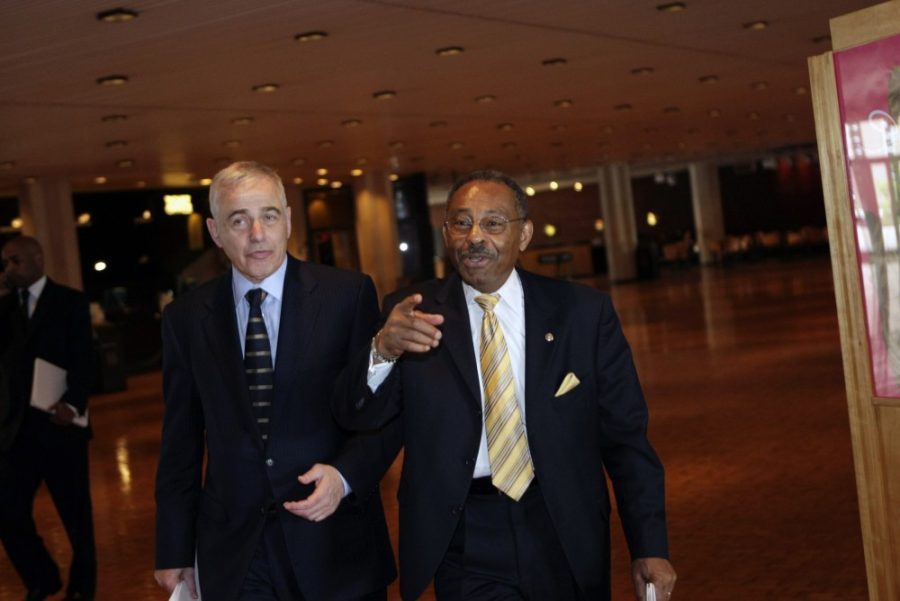University and state leaders lauded Herman’s departure as a significant move that will allow the university to move beyond an admissions scandal that rattled the
“”There are few universities in the country that have ever taken comparable steps to turn the page,”” said former U. of I. president
Herman’s resignation follows that of President
During the past three weeks, Herman negotiated a plan to resign on his own terms: He’ll give up the top campus job Monday and forgo a
Then, he will take a
A mathematics professor by training, Herman, 68, will move to the
The university’s board of trustees is expected to act on Herman’s resignation Friday.
“”It seems like a very generous arrangement,”” said engineering professor
Herman was at the center of the controversy over the university’s irregular admissions practices. He oversaw a system that tracked hundreds of politically connected applicants, known at the undergraduate level as Category I, at times overruling admissions officials who thought the students should be denied.
When he pushed the law school dean to admit subpar students, he offered scholarship money to recruit better students to offset the damage.
He also helped secure a high-paying university job for a former trustee’s future son-in-law, a Dutch citizen seeking work in
A state commission, formed in response to Tribune stories in May, investigated U. of I.’s admissions abuses and concluded that Herman was “”the ultimate decision-maker”” for the clouted applicants. The faculty and student
Herman has apologized repeatedly for his role in the scandal, and said in a speech last month that he had “”seriously considered”” resigning during the summer but instead decided “”to fight doggedly for the chance to stay at my work.””
Ikenberry said White’s resignation in late September changed the calculation. “”That certainly helped set a pattern, set a framework for his thinking about this,”” he said.
In an e-mail Tuesday to faculty, students and staff, Herman, who has worked at the university for 11 years as provost and then as chancellor, called his tenure “”the great privilege of my life.””
“”I will not reiterate the complicated and agonizing steps that have brought us to this place, except to say that I regret the circumstances. I’m confident that
Herman did not return calls from the Tribune.
His resignation is sandwiched between two events in which he played a significant role. Last week he celebrated a
“”Richard is one of the most deeply soulful, intelligent, imaginative, empathetic and creative leaders in higher education. His Renaissance-type spirit … has been both inspiring and highly aspirational for those of us who have had the privilege of working with him and under his leadership,”” Ross said.
As chancellor, Herman created the Illinois Promise scholarship program that has provided more than 1,000 low-income students with financial aid and a pledge to graduate debt-free. He has enhanced ethnic and multiracial studies programs, and created a Faculty Excellence program to help recruit and retain 100 top professors. He led the effort to create the
Gov.
“”I just think the university will do well with new leadership,”” he said. As for the details of Herman’s new employment deal, Quinn said: “”The board should examine all of that and decide what’s appropriate.””
U. of I. trustee
“”I don’t know that his position would have survived that inquiry,”” Koritz said. “”It’s nice that the university does not have to go through that painful process.””
U. of I. Board Chairman
“”We are very lucky to have Richard available to us to consult and direct and opine on the issues that we are going to face,”” Kennedy said. “”When somebody criticizes this deal, try to imagine the university ignoring somebody with that stature and that thoughtfulness and it’s crazy. … There are very few people who have his track record in
The university does not plan to appoint an interim chancellor, Kennedy said. The duties will be split between Ikenberry and interim provost
“”With the other reforms they have put in place, I would say this brings it to the end,”” he said. “”Assuming the reforms have been implemented, there’s nothing left to do but wish them luck. It’s a great university.””
———
(
———
(c) 2009, Chicago Tribune.
Visit the
Distributed by McClatchy-Tribune Information Services.









